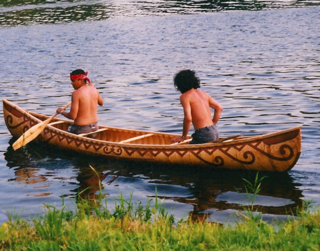Related Research Articles

Passamaquoddy Indian Township Reservation is one of two Indian reservations of the federally recognized Passamaquoddy tribe in Washington County, Maine, United States. The population was 760 at the 2020 census. Most of the 2,500 members of the tribe in the United States live in other parts of Maine. The reservation is located about 13 miles west-northwest of the city of Calais.

Passamaquoddy Pleasant Point Reservation is one of two reservations of the federally recognized Passamaquoddy tribe in Washington County, Maine, United States. The population was 692 as of the 2020 census.
The Jamestown S'Klallam Tribe is a federally recognized tribe of S'Klallam or Klallam Native Americans. They are on the northern Olympic Peninsula of Washington state in the northwestern United States.
The Penobscot are an Indigenous people in North America from the Northeastern Woodlands region. They are organized as a federally recognized tribe in Maine and as a First Nations band government in the Atlantic provinces and Quebec.

The Passamaquoddy are a Native American/First Nations people who live in northeastern North America. Their traditional homeland, Peskotomuhkatik, straddles the Canadian province of New Brunswick and the U.S. state of Maine in a region called Dawnland. They are one of the constituent nations of the Wabanaki Confederacy.

An Indian reservation is an area of land held and governed by a U.S. federal government-recognized Native American tribal nation, whose government is semi-sovereign, subject to regulations passed by the United States Congress and administered by the United States Bureau of Indian Affairs, and not to the U.S. state government in which it is located. Some of the country's 574 federally recognized tribes govern more than one of the 326 Indian reservations in the United States, while some share reservations, and others have no reservation at all. Historical piecemeal land allocations under the Dawes Act facilitated sales to non–Native Americans, resulting in some reservations becoming severely fragmented, with pieces of tribal and privately held land being treated as separate enclaves. This jumble of private and public real estate creates significant administrative, political, and legal difficulties.

Cobscook Bay is located in Washington County in the state of Maine. It opens into Passamaquoddy Bay, within the Bay of Fundy. Cobscook Bay is immediately south of the island city of Eastport, the main island of which straddles the two bays. In the 1930s, Cobscook Bay was part of the aborted Passamaquoddy Bay Tidal Power Project to generate electricity from its large tidal range.

The Bangor Daily News is an American newspaper covering a large portion of central and eastern Maine, published six days per week in Bangor, Maine.
Melvin Joseph Francis was the governor of the Passamaquoddy Pleasant Point Reservation, one of two reservations in Maine of the Passamaquoddy Indian tribe, from 1980 until 1990 and again since 2002.
Moose Island is an island in Eastport, Maine located at the entrance to Cobscook Bay from Passamaquoddy Bay in the Bay of Fundy. Shackford Head State Park is on Moose Island.
Oregon LNG is an American energy company whose sole project was a proposal to build a bi-directional liquefied natural gas (LNG) production, shipping, and receiving hub and a natural gas pipeline in northwest Oregon. Oregon LNG is controlled by the US conglomerate Leucadia National Corporation, listed on the New York Stock Exchange. The Oregon LNG Project announced that it was ceasing operations on 15 April 2016.
The Jordan Cove Energy Project was a proposal by Calgary-based energy company Pembina to build a liquefied natural gas export terminal within the International Port of Coos Bay, Oregon. The natural gas would have been transported to the terminal by the Pacific Connector Gas Pipeline. The proposal has been met with objections from landowners, Tribes, and commercial entities since 2010 and was cancelled in late 2021.
Merrion v. Jicarilla Apache Tribe, 455 U.S. 130 (1982), was a case in which the Supreme Court of the United States holding that an Indian tribe has the authority to impose taxes on non-Indians that are conducting business on the reservation as an inherent power under their tribal sovereignty.

Joint Tribal Council of the Passamaquoddy Tribe v. Morton, 528 F.2d 370, was a landmark decision regarding aboriginal title in the United States. The United States Court of Appeals for the First Circuit held that the Nonintercourse Act applied to the Passamaquoddy and Penobscot, non-federally-recognized Indian tribes, and established a trust relationship between those tribes and the federal government that the State of Maine could not terminate.
Thomas Norton Tureen is an American lawyer and entrepreneur known for his work with American Indian tribes. While an attorney with the Native American Rights Fund he pioneered the use of the Nonintercourse Act to obtain return of tribal lands lost 180 years earlier and federal recognition for previously non-federally recognized tribes. Tureen successfully litigated Joint Tribal Council of the Passamaquoddy Tribe v. Morton (1975), which established that the federal government has a trust responsibility to protect the land of all tribes, including those not previously recognized. Between 1972 and 1983 he helped obtain federal recognition for and the return of over 300,000 acres to five New England tribes. Tureen's work on behalf of the tiny Mashantucket Pequot Tribe in Connecticut led to the creation of the Foxwoods Resort Casino, one of the largest casinos in the world. He arranged the acquisition of Dragon Cement, New England's only cement producer, by the Passamaquoddy Tribe ; the acquisition of Phoenix Cement by the Salt River Pima Maricopa Indian Community ; originated 250 MW Moapa Solar, the first utility scale solar project in Indian Country and had lead responsibility for the creation of a partnership controlled by the Morongo Band of Mission Indians that holds an option to acquire a $400 million interest in an electric transmission upgrade in Southern California.
The Quoddy Tides is a community newspaper published in Eastport, Maine covering several communities in Washington County, Maine and Charlotte County, New Brunswick. It styles itself the "most easterly published newspaper in the United States". It is published on the second and fourth Friday of each month. The first issue was published on November 29, 1968.
Concouguash, christian name Francis Joseph Neptune, (1735–1834) was chief of the Passamaquoddy tribe during the American Revolutionary War. He succeeded his father, Bahgulwet, who died in 1778, and was succeeded by his own son, John Francis Neptune, in 1824. The term "chief" later became the word for governor. Becoming chief is passed along through family lineage and requires acceptance from the Passamaquoddies, Penobscots and Maliseet tribes. These three tribes share similar chief induction ceremonies, conducted simultaneously with eyewitnesses from each tribe present.
The Maine Indian Newsletter was a monthly newsletter published independently from 1966 to 1972 in Gardiner, Maine and Freeport, Maine. While the exact address is not listed, the office was on Pine Street in Freeport. All of the articles archived by Dawnland Voices have Pine Street listed as the place to send submissions and money.
Rena D. Newell is the Passamaquoddy tribal representative to the Maine House of Representatives. As of February 2020, she is serving her second two-year term and is the only tribal representative in the Maine House.
Donald Cotesworth Gellers, also known by his Jewish name Tuvia Ben-Shmuel Yosef, was an American lawyer. In the 1960s he lived in Eastport, Maine, where he represented members of the Passamaquoddy tribe in court and advocated for their civil rights. In 1968 he filed a land claim suit on the tribe's behalf. Immediately after filing the suit he was charged with constructive possession of six marijuana cigarettes. He was convicted on a felony charge and sentenced to prison. After an unsuccessful appeal process, he moved to Israel without serving his sentence. He returned to the United States in 1980 and practiced as a rabbi until his death. In 2020 he was granted a posthumous pardon by the state of Maine.
References
- 1 2 3 4 "Quoddy Bay LNG, Maine". Maine Project No Project. U.S. Chamber of Commerce. Retrieved 4 April 2013.
- 1 2 3 4 5 Godfrey, Robert. "Bureau of Indian Affairs, Defunct Quoddy Bay LNG Lose Again". Save Passamaquoddy Bay. Old Sow Publishing. Retrieved 4 April 2013.
- ↑ French, Edward. "Quoddy Bay LNG, tribe sign contract for sale of Perry land". The Quoddy Tides . The Quoddy Tides. Retrieved 5 April 2013.
- ↑ "Ntulankeyutmonen Nkihtaqmikon". Harpswell.info. Protect Passamaquoddy Bay. Retrieved 5 April 2013.
- ↑ "Tribe Cancels QBLNG Lease". Timeline: LNG Proposals in Passamaquoddy Bay. Save Passamaquoddy Bay.org. Retrieved 5 April 2013.
- ↑ French, Edward. "Sipayik council votes to end project with Quoddy Bay LNG". The Quoddy Tides. Retrieved 5 April 2013.
- ↑ Trotter, Bill. "Tribe Ends Contract With Quoddy Bay Firm". Downstream Today. McClatchy-Tribune Information Services. Retrieved 5 April 2013.